We are thrilled to share the outstanding representation of the Cell Biology department at the 2023 American
Society of Hematology (ASH) Annual Meeting and Exposition, held in San Diego from December 7-12, 2023.
Faculty members, post-doc fellows, and PhD trainees from the department’s hematology-focused research labs
showcased their cutting-edge research, exchanged ideas with attendees from other institutions, earned
recognition, and contributed significantly to this prestigious event.
The ASH Annual Meeting and Exposition is the world’s premier event in hematology, providing a platform for
experts, researchers, and clinicians to come together, exchange knowledge, and advance the understanding and
treatment of blood disorders. This year, the event featured a diverse array of sessions, workshops, and
presentations covering the latest breakthroughs and innovations in hematology.
Research Requirements
Samuel Taylor, PhD, was selected by the
highly selective ASH abstract committee to
deliver an oral presentation on his research
entitled “Transcription Factor Redistributors
Pharmacologically Activate Non-Canonical
Gene Networks to Drive AML Differentiation”
(Abstract 119). Samuel also received an ASH
Abstract Achievement Award – a highly
prestigious honor. After his presentation,
Samuel expertly fielded a Q&A discussion on
his innovative research identifying a novel
therapeutic approach for PU.1-corrupted
acute myeloid leukemia. Samuel is a member
of the Steidl lab.
 Dr. Samuel Taylor presenting his research during the oral abstract
session “Chemical Biology and Experimental Therapeutics: Novel
Targets in Blood Disorders”
Dr. Samuel Taylor presenting his research during the oral abstract
session “Chemical Biology and Experimental Therapeutics: Novel
Targets in Blood Disorders”
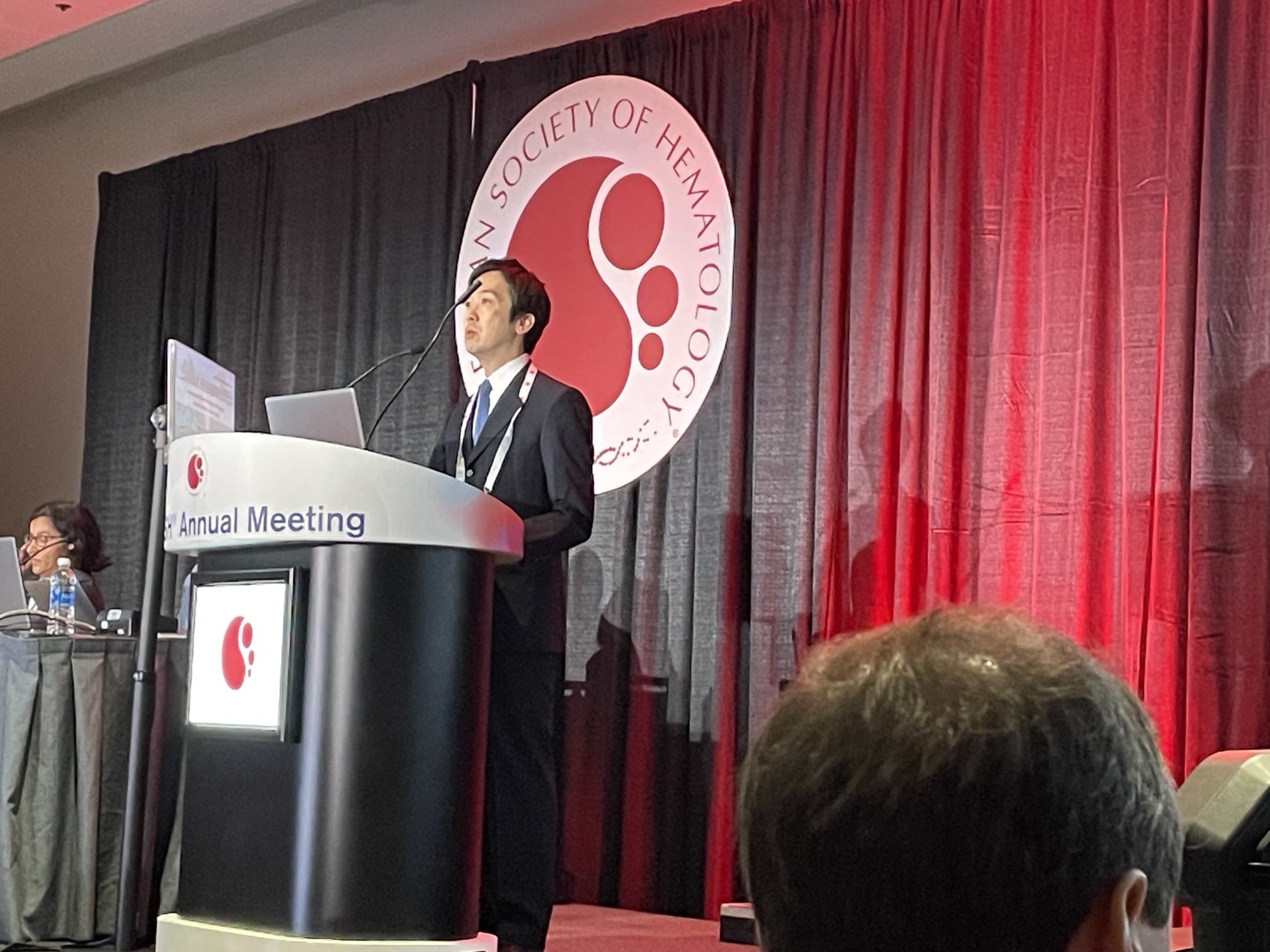 Dr. Shoichiro Takeishi presenting his research during the
oral abstract session “Bone Marrow Microenvironment:
Bone Marrow Microenvironment in Health and Disease
Hematology Disease Topics & Pathways”
Dr. Shoichiro Takeishi presenting his research during the
oral abstract session “Bone Marrow Microenvironment:
Bone Marrow Microenvironment in Health and Disease
Hematology Disease Topics & Pathways”
Shoichiro Takeishi, PhD, was chosen to deliver an
oral presentation for his project entitled
“Hematopoietic Stem Cell Numbers Are Regulated at
Both Systemic and Local Levels” (Abstract 511).
Shoichiro presented to a packed room of scientists
and expertly fielded a Q&A discussion on his novel
research on the regulatory mechanisms governing
total hematopoietic stem cell numbers. Shoichiro was
a member of the late Paul Frenette’s lab, now
receiving guidance from Drs. Ulrich Steidl and Kira
Gritsman.
Poster Presentations
PhD candidate Karl Roberts was selected to present his
thesis research, entitled “Proof-of-Concept in a Murine
Model of Treatment of Thrombotic Thrombocytopenic
Purpura Using Engineered Red Blood Cells Expressing
Fragments of ADAMTS13 on Their Membrane” (Abstract 1265), as a poster presentation. Karl also received the
prestigious ASH Abstract Achievement Award. During the
two-hour poster session, Karl presented his findings to
various scientists, gaining valuable insights and leads for
future collaborations. Karl is a member of the Bouhassira lab.
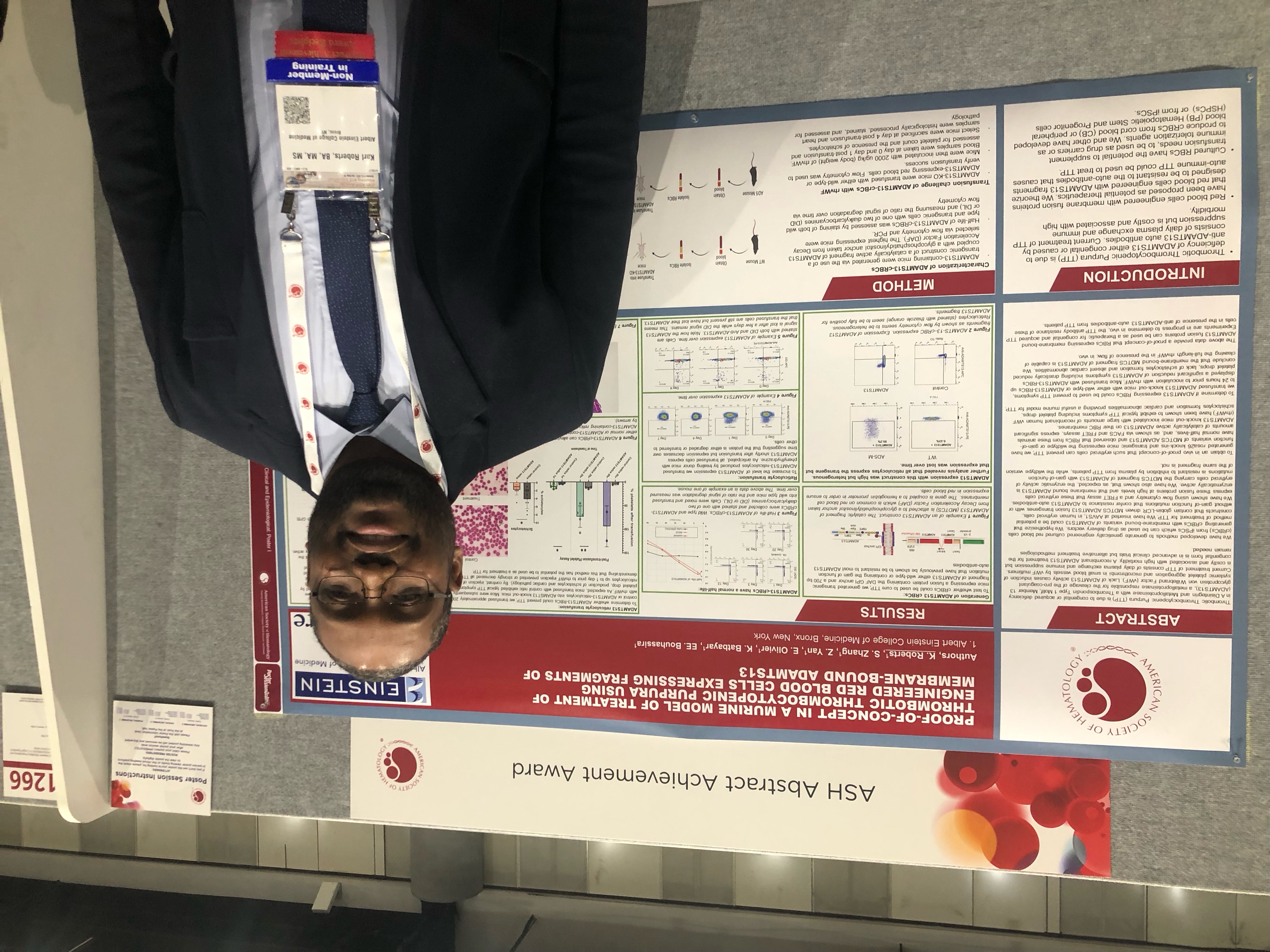 Cell Biology PhD trainee Karl Roberts presenting his
poster during the Saturday evening poster session
Cell Biology PhD trainee Karl Roberts presenting his
poster during the Saturday evening poster session
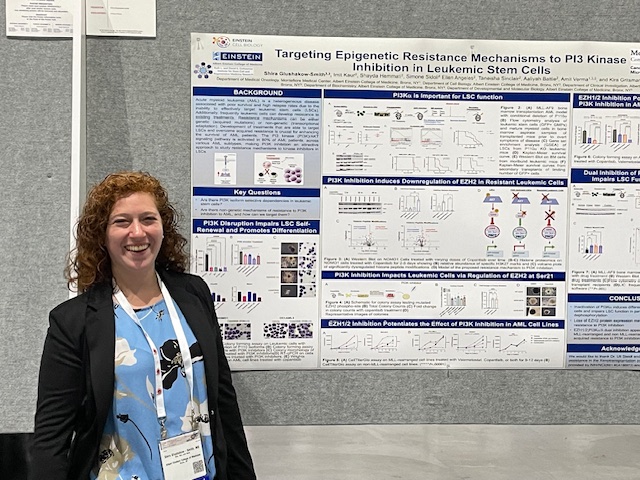 Cell Biology PhD trainee Shira Glushakow-Smith
presenting her poster during the Saturday evening
poster session
Cell Biology PhD trainee Shira Glushakow-Smith
presenting her poster during the Saturday evening
poster session
PhD candidate Shira Glushakow-Smith was selected to
present her thesis research, entitled “Targeting Epigenetic
Resistance Mechanisms to PI3 Kinase Inhibition in Leukemic
Stem Cells” (Abstract 1426), as a poster presentation. During
the two-hour poster session, Shira discussed her findings
with various experts, gained valuable feedback and insights,
and explored future collaborations to further her research on
combining EZH1/2 dual inhibitors with PI3K inhibitors to
eradicate leukemic stem cells. Shira is a member of the
Gritsman lab.
Cell Biology Professor Eric Bouhassira, PhD, was selected to present his lab’s research, entitled “iPSC-Derived
KitD816V/JAK2V617F Double-Mutant Kitjak Cell Lines Allow Inexpensive Large-Scale Production of Enucleated
Red Blood Cells in the Absence of SCF and Erythropoietin” (Abstract 2249), as a poster presentation. Dr.
Bouhassira’s lab has developed methods to mass-produce cultured red blood cells from hematopoietic stem
cells and from pluripotent stem cells; as well as conducting foundational research for gene therapy and other
therapeutic strategies for the treatment of various hemoglobinopathies.
Cell Biology Adjunct Professor Nicholas Chiorazzi, MD, had three poster presentations representing the depth of
his lab’s research at the conference: (1) “Investigation into Intraclonal Heterogeneity of CXCR4 Dim CD5 Bright Chronic
Lymphocytic Leukemia Cells Identifies Distinct Activation Signatures” (Abstract 3259); (2) “Skewing Towards
Effector Memory Cells in CLL Is Associated with IGHV-Mutation Status and IFNγ and IL-4” (Abstract 4625); and (3)
“Normal B Cells in MBL Exhibit Distinct Transcriptomes Compared to Those of Healthy Individuals, Although They
Differ in Activation State based on IGHV Mutation Status” (Abstract 4632). Dr. Chiorazzi’s lab – located at The
Feinstein Institute for Medical Research – is primarily focused on understanding the pathogenetic events that
drive the development and evolution of chronic lymphocytic leukemia.
Scientific Workshops and Programs
Scientific workshops kick off the ASH Annual Meeting and Exposition. These are interactive discussions on the
latest scientific developments in a particular field of hematology. AECOM Cell Biology’s own Ulrich Steidl, Britta
Will, and Keisuke Ito were part of the execution of two scientific workshops at ASH.
Ulrich Steidl, MD, PhD served as
co-chair and organizer of the
Scientific Workshop on Myeloid
Development. This workshop,
focused primarily on the basic
science underlying myeloid cell
development and
pathophysiology, provided an
educational platform for basic and
translational scientists alike to
review the latest advances in
normal and malignant
myeloid/stem cell biology. Dr.
Steidl played an instrumental role
in selecting the 16 expert scientists
from across the world to cover key advances in stem cell biology, signaling and development, myeloid
malignancies, and gene regulation in myeloid differentiation.
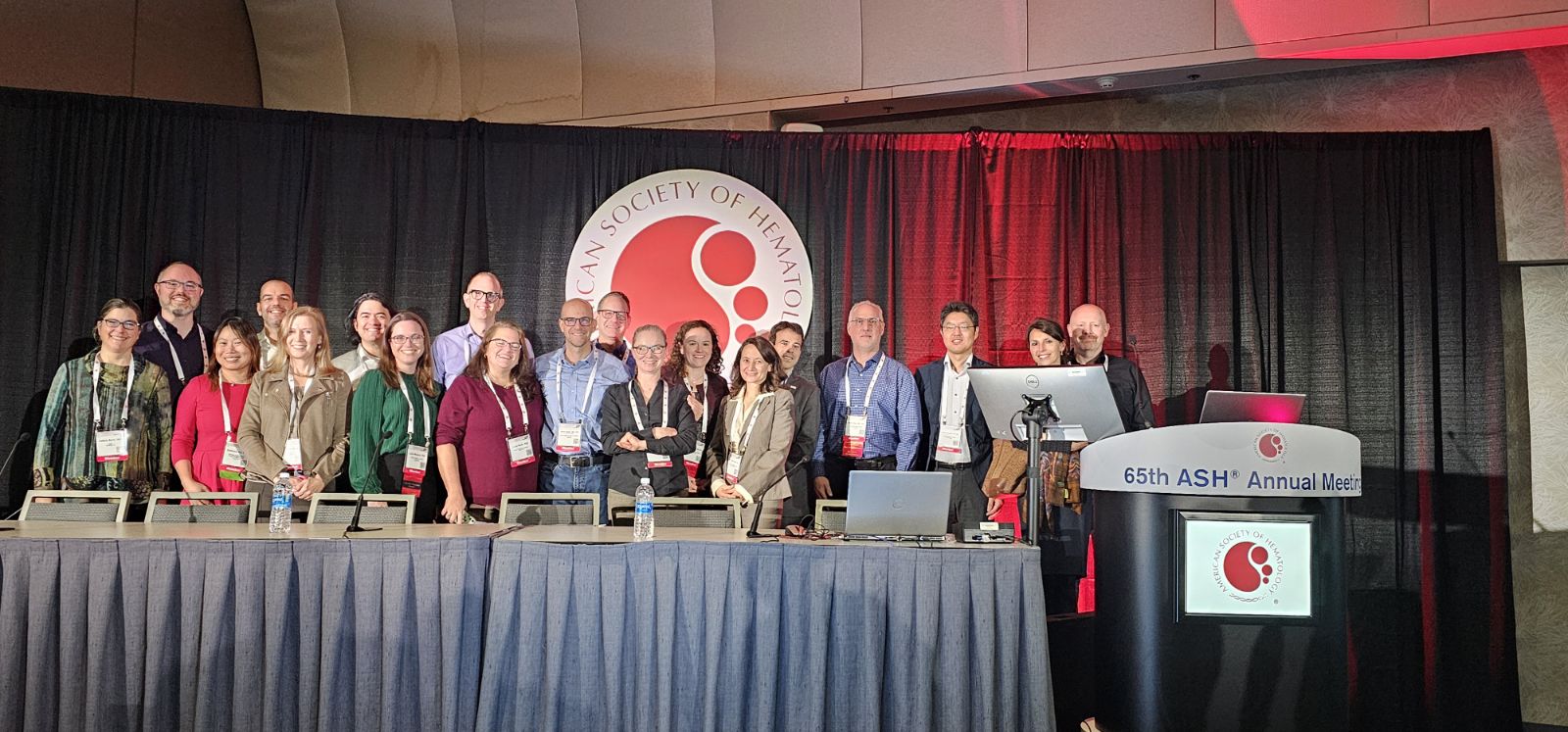 Dr. Ulrich Steidl, co-chair of the Scientific Workshop on Myeloid Development,
pictured with his co-chair and selected faculty presenters
Dr. Ulrich Steidl, co-chair of the Scientific Workshop on Myeloid Development,
pictured with his co-chair and selected faculty presenters
 Einstein faculty Keisuke Ito, Britta Will, and Marina
Konopleva, with Dr. Aaron Schimmer of Princess Margaret
Cancer Center, during the Scientific Workshop on
Mitochondria and Metabolism in Blood Cancer – From
Worms to Patients
Einstein faculty Keisuke Ito, Britta Will, and Marina
Konopleva, with Dr. Aaron Schimmer of Princess Margaret
Cancer Center, during the Scientific Workshop on
Mitochondria and Metabolism in Blood Cancer – From
Worms to Patients
Britta Will, PhD presented her lab’s research findings
during the Scientific Workshop on Mitochondria and
Metabolism in Blood Cancer – From Worms to
Patients. This session brought together translational
scientists and clinicians focused on studying
mitochondrial stress and metabolic pathways in blood
cancers. Dr. Will’s presentation, entitled Iron
Homeostasis Dependent Regulation of Hematopoietic
Stem Cell Fate, was part of the Mitochondrial and
Metabolism – Fundamental Discovery and Model
Organisms session. Notably, the workshop was
organized by co-chair Dr. Marina Konopleva, MD, PhD,
Professor of Oncology, Molecular Pharmacology at
Albert Einstein College of Medicine, and the session
featuring Dr. Will’s seminar was moderated by
Keisuke Ito, MD, PhD, Professor of Cell Biology,
Medicine at Albert Einstein.
Lastly, throughout the conference, scientific programs were
held to advance research in particular fields. Dr. Keisuke Ito
served as chair for the Single Cell Omics and High-Resolution
Imaging to Unravel the Role of the Niche in Stress and Ageing
Hematopoiesis scientific program. This session dived deep into
the application of newly developed single cell omics
technologies to investigate the role of the bone marrow niche
during inflammatory, stress, and aging.
Beyond the scientific sessions, the conference provided a
unique opportunity to reconnect with former lab members
and engage with current and previous collaborators. It was a
time to strengthen existing partnerships, forge new
connections, and foster collaborative efforts that will
continue to drive progress in hematology research.
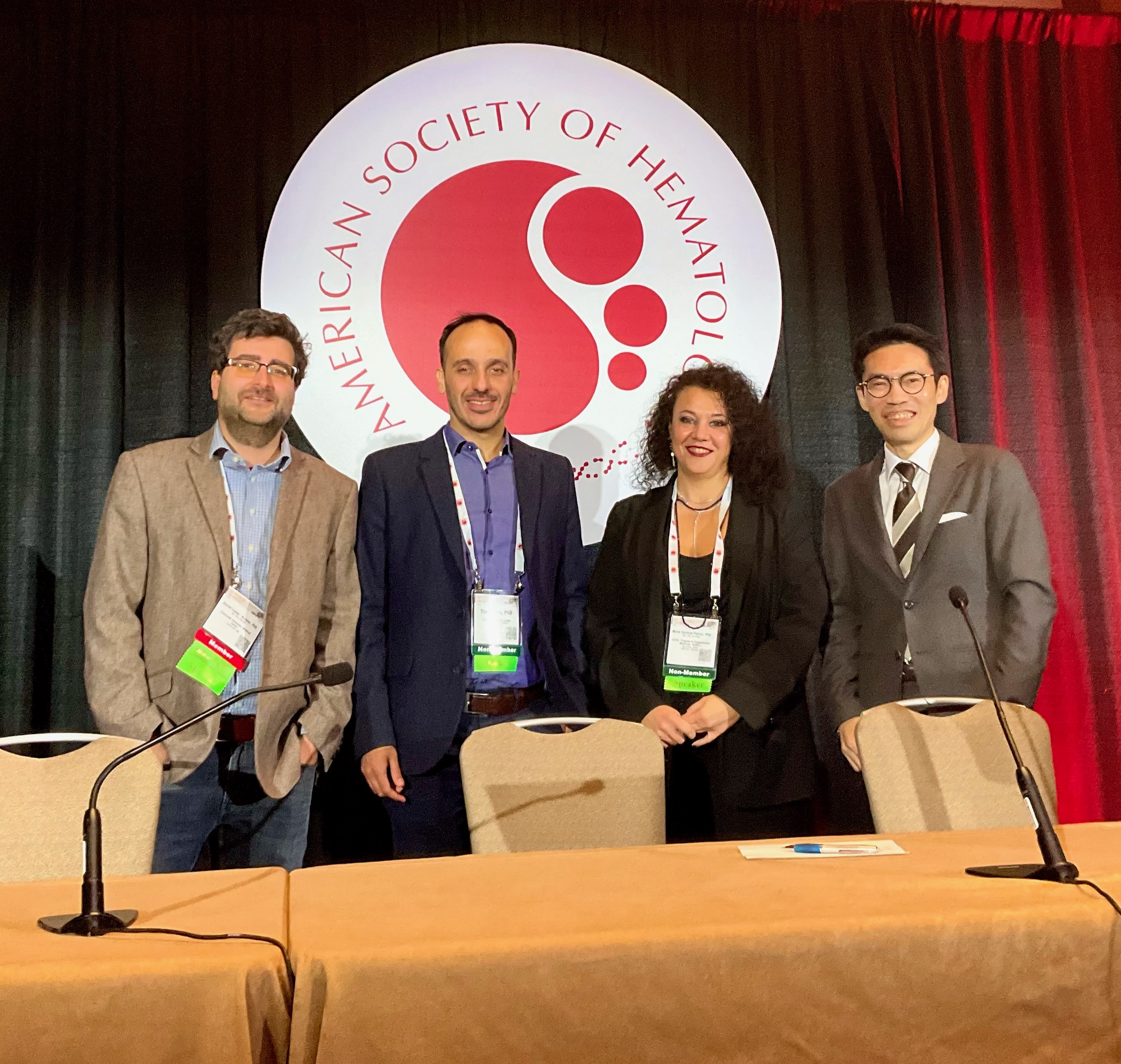 Dr. Keisuke Ito served as chair for the scientific
program titled “Single Cell Omics and High-
Resolution Imaging to Unravel the Role of the
Niche in Stress and Ageing Hematopoiesis”, which
featured a presentation from former Einstein Cell
Biology post-doctoral fellow Dr. Dani Lucas
Dr. Keisuke Ito served as chair for the scientific
program titled “Single Cell Omics and High-
Resolution Imaging to Unravel the Role of the
Niche in Stress and Ageing Hematopoiesis”, which
featured a presentation from former Einstein Cell
Biology post-doctoral fellow Dr. Dani Lucas
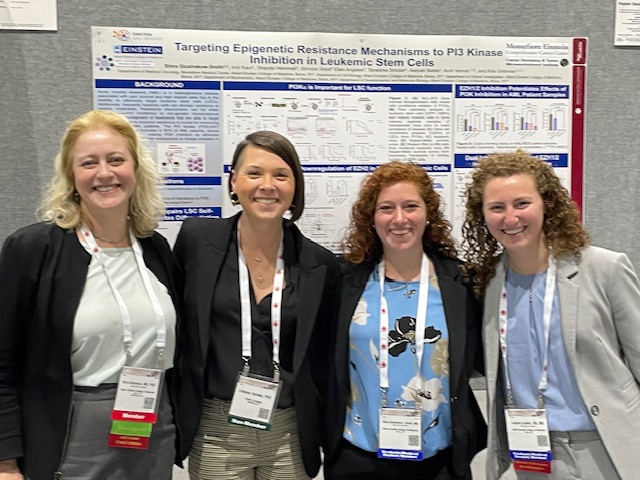 Dr. Kira Gritsman with her current PhD trainee Shira
Glushakow-Smith, along with Gritsman lab alumni Dr.
Lindsay Gurska and Lauren Laufer
Dr. Kira Gritsman with her current PhD trainee Shira
Glushakow-Smith, along with Gritsman lab alumni Dr.
Lindsay Gurska and Lauren Laufer
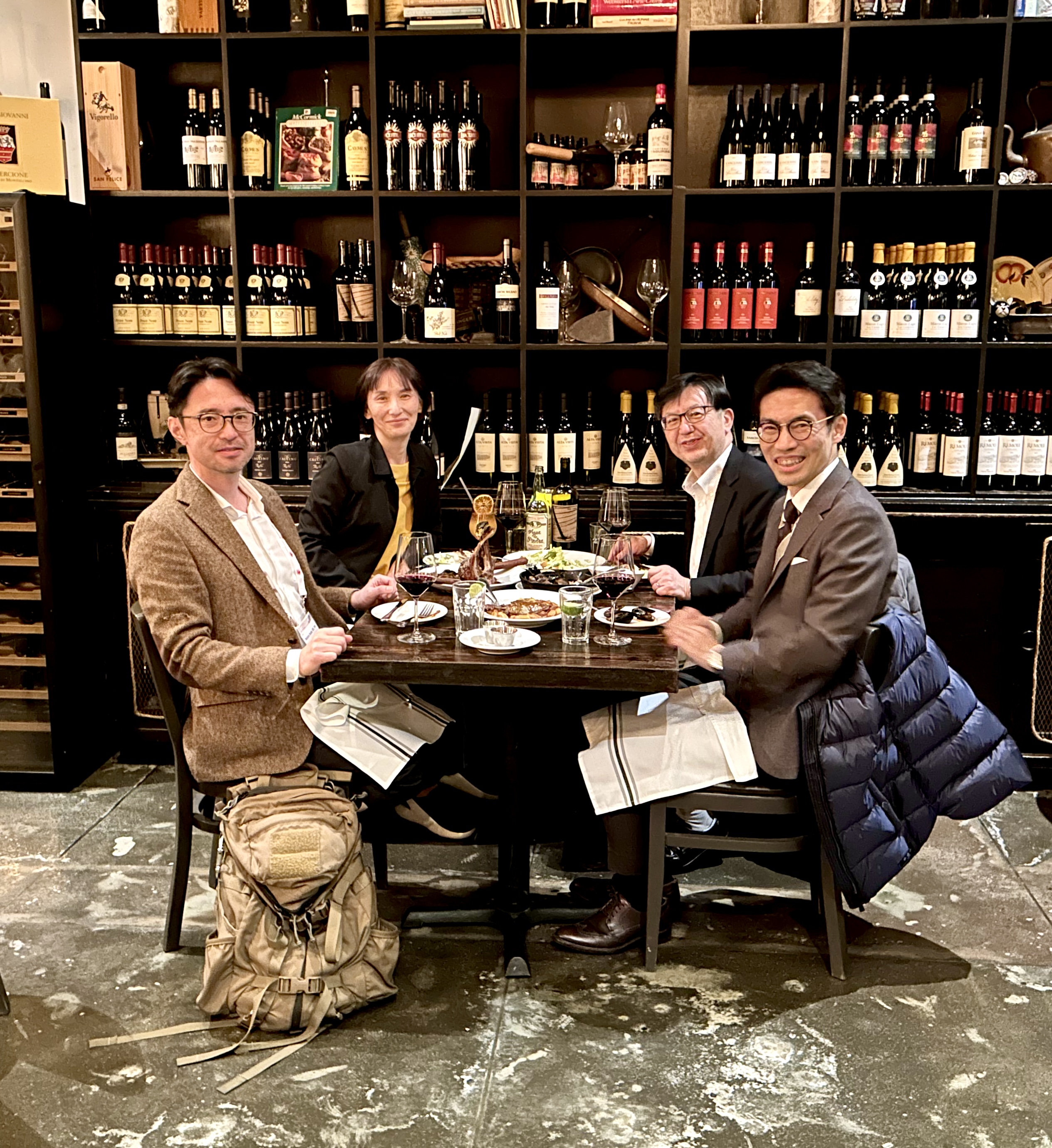 Dr. Keisuke Ito at dinner with Dr. Noboru Asada,
former post-doctoral fellow from the lab of the
late Paul Frenette, MD, Professor of Cell Biology
at Albert Einstein College of Medicine
Dr. Keisuke Ito at dinner with Dr. Noboru Asada,
former post-doctoral fellow from the lab of the
late Paul Frenette, MD, Professor of Cell Biology
at Albert Einstein College of Medicine
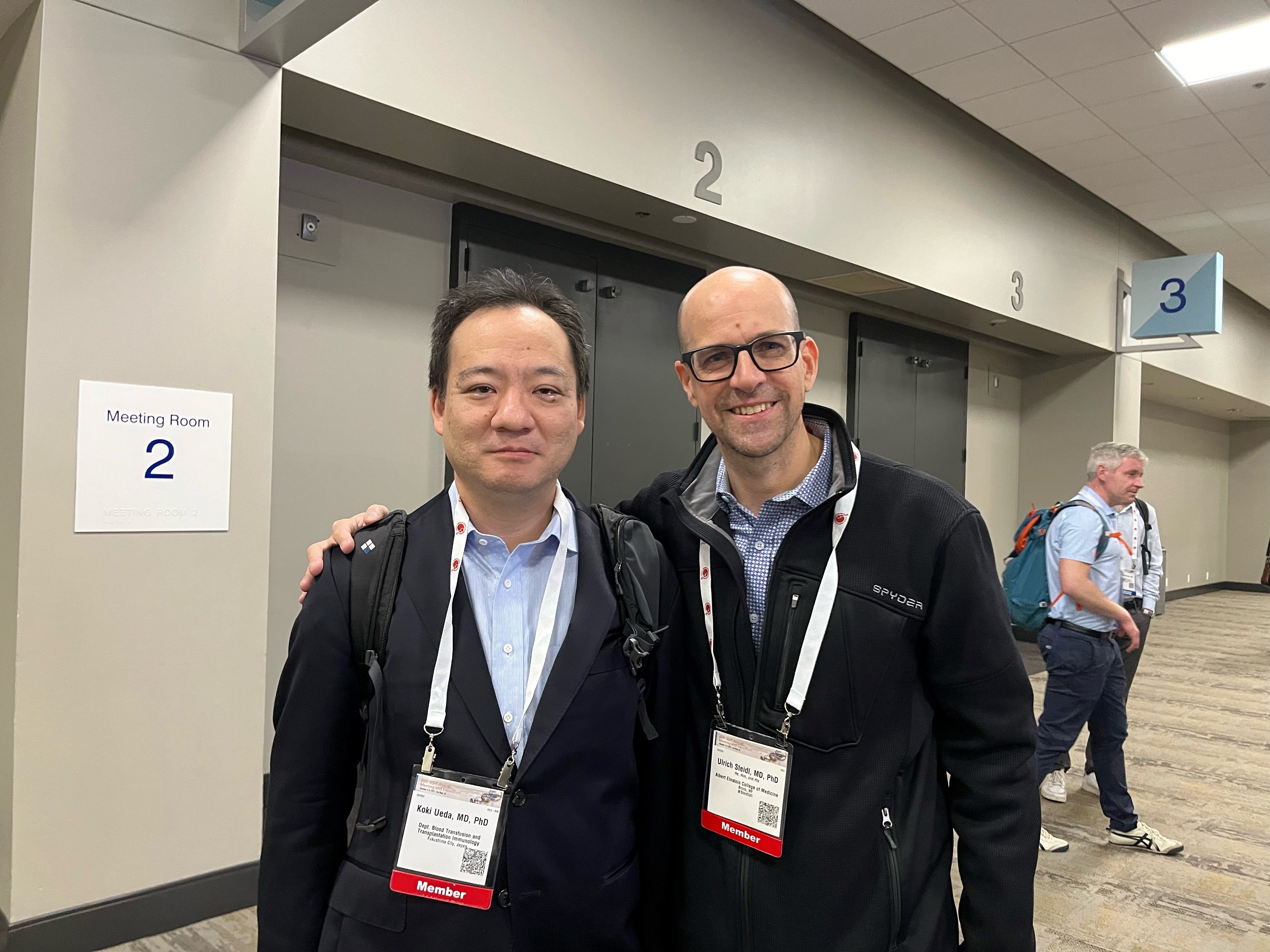 Dr. Ulrich Steidl with Dr. Koki Ueda, former Einstein Cell
Biology post-doctoral fellow; now Associate Professor,
Department of Transfusion Medicine, Fukushima
Medical University, Japan
Dr. Ulrich Steidl with Dr. Koki Ueda, former Einstein Cell
Biology post-doctoral fellow; now Associate Professor,
Department of Transfusion Medicine, Fukushima
Medical University, Japan
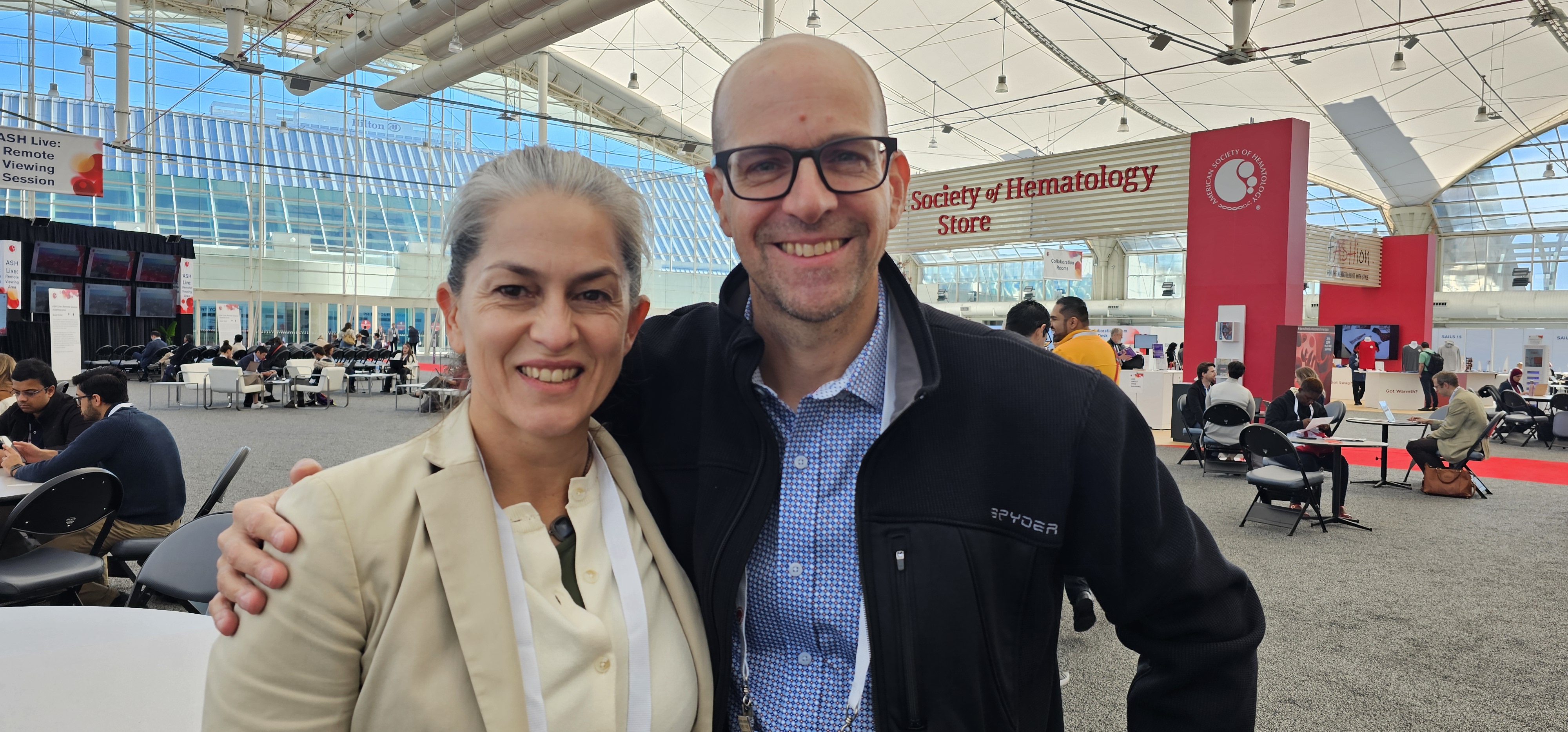 Dr Ulrich Steidl with Dr. Laura Barreyro, former
Einstein Cell Biology PhD student; now Principal
Scientist, Janssen Pharmaceutical Companies of
Johnson & Johnson
Dr Ulrich Steidl with Dr. Laura Barreyro, former
Einstein Cell Biology PhD student; now Principal
Scientist, Janssen Pharmaceutical Companies of
Johnson & Johnson
We are immensely proud of our department’s contributions and accomplishments at the 2023 ASH Annual
Meeting and Exposition. Within our diverse department, basic and translation hematology research is the
primary focus of several of our labs, and these achievements reflect their commitment to advancing the field of
hematology and fostering collaboration with the broader scientific and medical community. Congratulations to
all of our department members for their remarkable efforts and dedication!